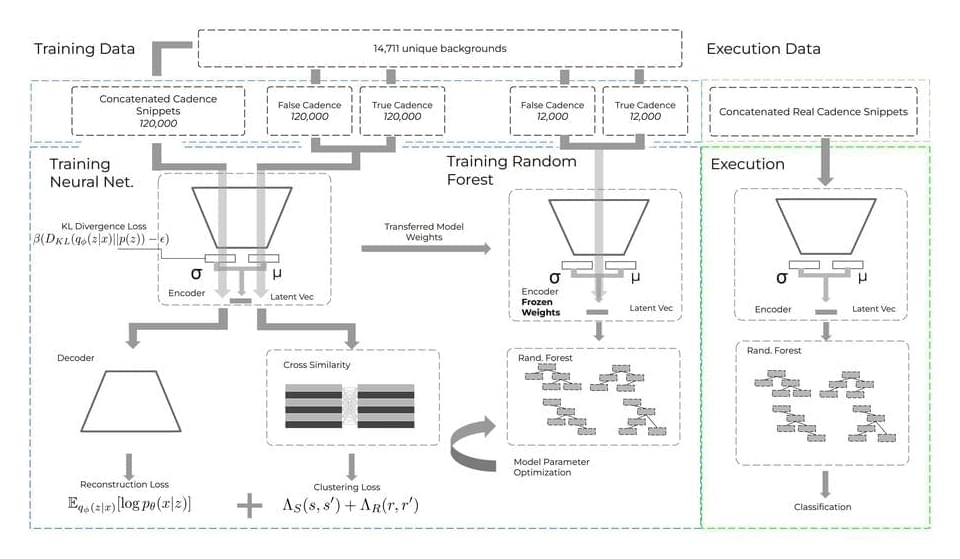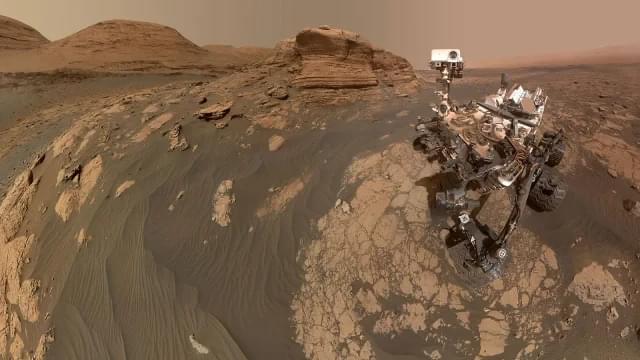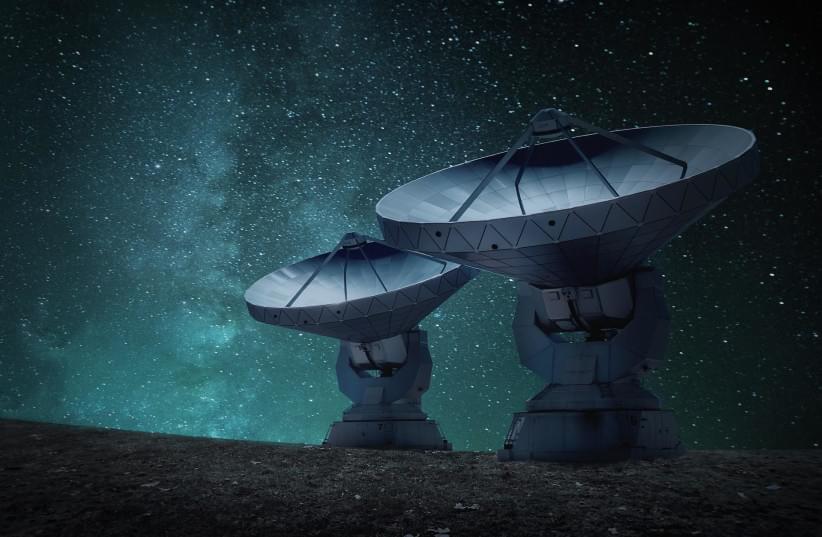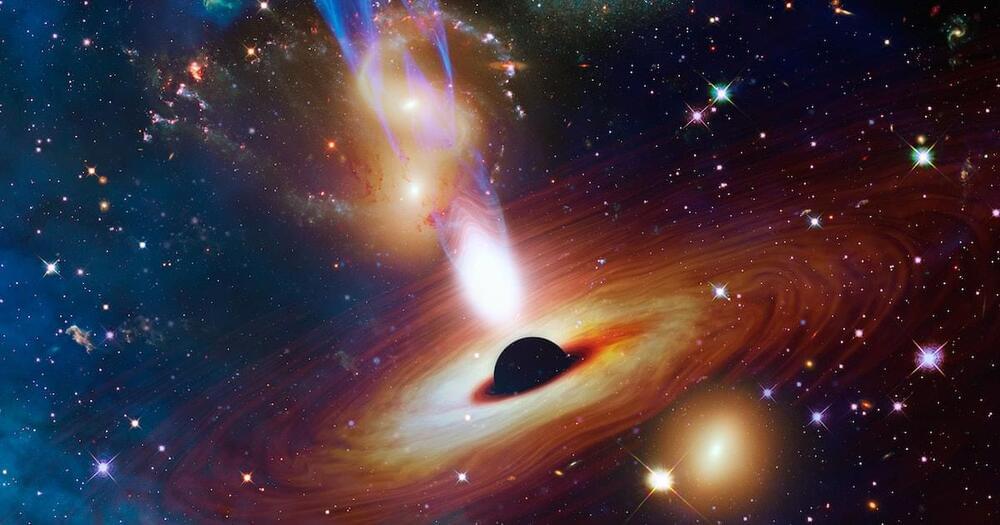A team of scientists has proposed that we could use existing Earth-based observatories to hunt for highly intelligent alien life forms and their advanced warp drive technologies.



The goal of the Search for Extraterrestrial Intelligence (SETI) is to quantify the prevalence of technological life beyond Earth via their “technosignatures”. One theorized technosignature is narrowband Doppler drifting radio signals.
The principal challenge in conducting SETI in the radio domain is developing a generalized technique to reject human radio frequency interference (RFI). Here, we present the most comprehensive deep-learning based technosignature search to date, returning 8 promising ETI signals of interest for re-observation as part of the Breakthrough Listen initiative.
The search comprises 820 unique targets observed with the Robert C. Byrd Green Bank Telescope, totaling over 480, hr of on-sky data. We implement a novel beta-Convolutional Variational Autoencoder to identify technosignature candidates in a semi-unsupervised manner while keeping the false positive rate manageably low. This new approach presents itself as a leading solution in accelerating SETI and other transient research into the age of data-driven astronomy.

A prime target in the search for extraterrestrial life is Europa, a moon of Jupiter that’s covered with a sheet of salty ice. But what kind of salt is there? Researchers say they’ve created a new kind of salt crystal that could fill the bill, and perhaps raise hopes for finding life under the ice.
This salt crystal is both exotic and common: It’s actually table salt — also known as sodium chloride, with the chemical formula NaCl — but bound up with water molecules to form a hydrate that doesn’t exist naturally on Earth.
Andrew Strominger is a theoretical physicist at Harvard. Please support this podcast by checking out our sponsors:
- Eight Sleep: https://www.eightsleep.com/lex to get special savings.
- Rocket Money: https://rocketmoney.com/lex.
- Indeed: https://indeed.com/lex to get $75 credit.
- ExpressVPN: https://expressvpn.com/lexpod to get 3 months free.
EPISODE LINKS:
Andrew’s website: https://www.physics.harvard.edu/people/facpages/strominger.
Andrew’s papers:
Soft Hair on Black Holes: https://arxiv.org/abs/1601.00921
Photon Rings Around Warped Black Holes: https://arxiv.org/abs/2211.
PODCAST INFO:
Podcast website: https://lexfridman.com/podcast.
Apple Podcasts: https://apple.co/2lwqZIr.
Spotify: https://spoti.fi/2nEwCF8
RSS: https://lexfridman.com/feed/podcast/
Full episodes playlist: https://www.youtube.com/playlist?list=PLrAXtmErZgOdP_8GztsuKi9nrraNbKKp4
Clips playlist: https://www.youtube.com/playlist?list=PLrAXtmErZgOeciFP3CBCIEElOJeitOr41
OUTLINE:
0:00 — Introduction.
1:12 — Black holes.
6:16 — Albert Einstein.
25:44 — Quantum gravity.
29:56 — String theory.
40:44 — Holographic principle.
48:41 — De Sitter space.
53:53 — Speed of light.
1:00:40 — Black hole information paradox.
1:08:20 — Soft particles.
1:17:27 — Physics vs mathematics.
1:26:37 — Theory of everything.
1:41:58 — Time.
1:44:24 — Photon rings.
2:00:05 — Thought experiments.
2:08:26 — Aliens.
2:14:04 — Nuclear weapons.
SOCIAL:
- Twitter: https://twitter.com/lexfridman.
- LinkedIn: https://www.linkedin.com/in/lexfridman.
- Facebook: https://www.facebook.com/lexfridman.
- Instagram: https://www.instagram.com/lexfridman.
- Medium: https://medium.com/@lexfridman.
- Reddit: https://reddit.com/r/lexfridman.
- Support on Patreon: https://www.patreon.com/lexfridman

But with so many signals that could happen, how can scientists possibly sift through all of them to try to find a possible alien transmission?
Well, it turns out, scientists found the answer: Don’t. Instead, let AI do it for you.
That’s exactly what the researchers behind this study did, utilizing an AI algorithm to look through signals from a designated 820 different star systems. These targets were made from the Hipparcos catalogue, a collection of data from 118,200 stars made by the European Space Agency’s (ESA) Hipparcos satellite, and totaled over 480 hours of data.
While Venus has long been ignored as a potential home for alien existence, MIT researchers say that the skies of Venus may be hosting aerial extraterrestrial life.
Phosphine Found
The Space Academy reports that, in the pursuit of extraterrestrial intelligence, Venus has hardly been considered. The reason behind such discarding is quite reasonable, given that the surface temperature of the planet reaches over 800 degrees Fahrenheit. Moreover, the density of its atmosphere adds pressure that is close to a hundred times greater than that of the earth’s. Venus also precipitates sulfuric acids, which may cause serious burns among humans.

It actually makes a lot of sense from a computing standpoint.
If life is common in our Universe, and we have every reason to suspect it is, why do we not see evidence of it everywhere?
This is the essence of the Fermi Paradox, a question that has plagued astronomers and cosmologists almost since the birth of modern astronomy.
It is also the reasoning behind the Hart-TIpler Conjecture, one of the many (many!) proposed resolutions, which asserts that if advanced life had emerged in our galaxy sometime in the past, we would see signs of their activity everywhere we looked. Possible indications include self-replicating probes, megastructures, and other Type III-like activity.

Scientists at Tennessee’s Oak Ridge National Laboratory are attempting to establish a doorway to a parallel reality. The goal of the project is to depict a world that is nearly comparable to ours and where life is mirrored. The experiment’s leader, Leah Broussard, told NBC that the strategy is a little crazy, but it will completely transform the game. If the studies are successful, particles will be able to morph into images of themselves, allowing them to burrow through a solid wall. This might demonstrate that the cosmos we observe is merely half of what exists. Broussard revealed that he believes the test will yield a result of zero.